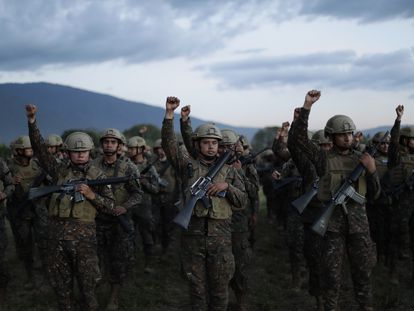The toll of El Salvador’s gang crackdown: ‘Police and soldiers have absolute power’
The Mara Salvatrucha, the largest and most dangerous criminal structure in the country, is losing ground thanks to President Nayib Bukele’s state of emergency. But at what cost?
/cloudfront-eu-central-1.images.arcpublishing.com/prisa/CKWZ6SHNXVFVDGYLA6S4QAQCVI.jpg)
“Now you can walk around here, and you won’t see any gang members, but I don’t recommend doing it because the police could take you away, particularly you because you have tattoos,” says Eva, a 27-year-old from La Montreal, a populous neighborhood in the metropolitan area of San Salvador. Since the government of Nayib Bukele declared a state of emergency in El Salvador eight months ago, the inhabitants of La Montreal, a historic stronghold of the Mara Salvatrucha-13 (MS-13), are less afraid of gang members. Now, instead, they fear the police and the army, who have besieged the community and many others like it across the country.
“Here the police and the soldiers have absolute power. They can take away anyone just because they don’t like him. They have become like another gang,” says Eva, sitting in an old armchair in the small room of her house, as she looks out of the corner of her eye to make sure that no one is listening to the conversation. Eva, who does not want to reveal her full name for security reasons, is with her husband, mother, two young children and two other neighbors who have come together to talk about how life in La Montreal has changed under President Nayib Bukele’s state of emergency.
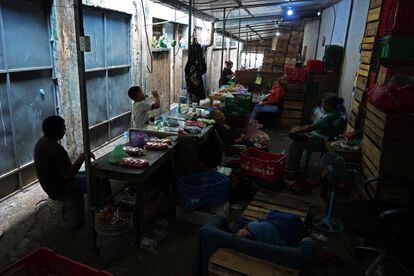
Until a few years ago, strangers would think twice about entering La Montreal. In 2010, a vendetta between MS-13 and rival gang Barrio 18 (or the 18th Street gang), which controlled the neighborhood next door, ended in the murder of 17 people, who were burned to death inside a minibus when they were returning from work.
Now, in the streets of this neighborhood, you don’t see gang members with baggy clothes, tattooed faces and weapons on their belts. What you see, if anything, is a few women shopping in small stores, or bringing their children home from school. Police and soldiers with covered faces also walk around the neighborhood, scanning the passers-by and stopping any young man.
“A few months ago they took my son-in-law, Jorge Erazo. He is 24 years old and is a young worker and student doing his third year of a Business Administration degree. His father had the same name as him, and he was the driver of the bus that the gang members burned in 2010,″ says Ana, one of the neighbors gathered in the living room.
What is happening in La Montreal is not unique to the community. Across the country, Bukele’s state of emergency has put a chokehold on the Mara Salvatrucha-13, the largest criminal structure in the country. Since the measure was declared on March 27, more than 58,000 people have been arrested. But the crackdown on gang violence has led to “flagrant” human rights violations, according to a June report by Amnesty International. Thousands of complaints have been made over illegal arrests, torture, murder under police custody and forced displacement caused by the police and the army. El Salvador may be winning the war against the gangs, but it is doing so at the cost of human rights and constitutional freedoms.
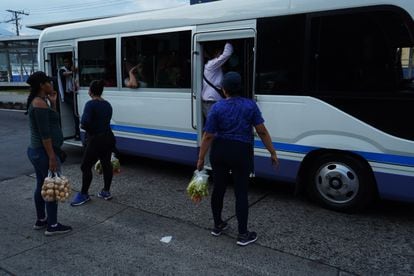
To assess the impact of the state of emergency, EL PAÍS spoke with two businessmen in the public transportation sector, two market leaders, two police investigators and a gang prosecutor. The newspaper also visited three communities in the San Salvador metropolitan area which have been historically controlled by MS-13. Everything suggests that MS-13 is on its last legs. But, according to these sources, members of the police and the army have filled this vacuum and are reportedly now the ones committing crimes.
Although this situation may not hold true for all communities in El Salvador, the crackdown has hurt MS-13′s influence in three key areas: extortion, territorial control and recruitment of new members. “The police and soldiers came here, and they arrested nearly everyone. They came in trucks, and it was like they didn’t want to leave anyone behind. They took several people who are gang members, but they also took a lot of innocent people,” continues Eva.
According to some of the locals consulted for this report, people are leaving La Montreal in droves. In addition to gang members who fled the community fearing arrest, many residents without any links to gangs have had to flee the country after police threatened to imprison them if they did not cooperate and provide information.
The MS-13 may be in its death throes, but fear of the gang has not entirely disappeared. In La Montreal, as in other communities visited by this newspaper, the residents continue to obey the rules established by the gangs: “You cannot receive visits or family members who come from areas of the opposing gang, nor can you speak with the police or be a snitch. You may not see them right now, but the gang has eyes and ears everywhere and one day they are going to be released from jail,” explains Ana.
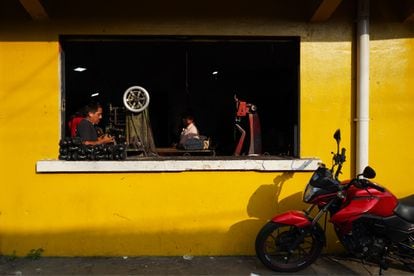
Bukele’s crackdown is the biggest attack a government has launched against the MS-13 and Barrio 18 gangs in history. The president declared the state of emergency after the criminal organizations massacred 87 people in a single weekend. The violence was allegedly the result of a broken secret truce between the gangs and the Bukele administration – allegations that the government denies. The massacre was a heavy blow to the Bukele administration, which had boasted to the world that it was keeping the gangs under control, something that no other Salvadoran government had achieved before.
National and international organizations, such as the UN Committee Against Torture, have raised alarm over the serious human right violations that have taken place under the state of exception, but the Salvadoran government has ignored them, instead arguing that the country is safe enough for big public events, such as the recent Bad Bunny concert. And it shows no sign of backing down. The government recently deployed more soldiers and police to “extract” gang members from cities across the country. At the beginning of April, according to Bukele, the number of gang members stood at 86,000, of whom some 16,000 were incarcerated.
Bukele’s tactics are not new. Since 2004, all governments have tried to repress or negotiate with these groups. But in the end, they have only succeeded in strengthening them. However, experts on the subject agree that this time there is a radical difference: control of the entire justice system is concentrated in one person: the president.
“One day the gang members are going to get out, and they are going to be thirsty for revenge”
Two businessmen who run bus routes in El Salvador spoke with EL PAÍS about how the crackdown has eased extortion payments. Both explained, on condition of anonymity, that since the mid-1990s they have been covering routes that circulate in the metropolitan area of San Salvador. They belong to one of the largest transportation union organizations in the country and have been paying extortion money to the MS-13 and Barrio 18 gangs for more than a decade.
“I have been paying extortion money since 2004 and since then, there has not been a single month in which I have not paid,” says one of the businessmen. “However, it must be said: since the state of emergency began, I have been paying much less than before.” Both estimate that, after eight months of the measure, the extortion of public transportation has fallen by 70%. This data differs from that of the National Transportation Board, which calculated a reduction of 95% last August.
“It is not true that they have stopped paying. On just one of the routes that I work, we pay $4,500 a month to the MS-13,” says one of the businessmen, while showing WhatsApp conversations on his phone in which he coordinates with a gang member to deliver the extortion money. “I can attest that many more colleagues continue to pay. Much less than before, but they continue to pay,” he adds.
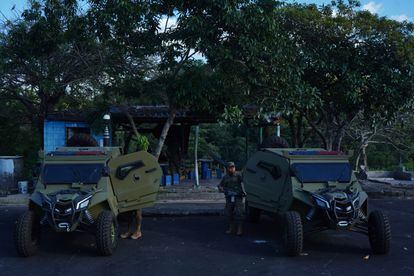
Data from the National Transportation Board indicate that in 2016 alone, the sector paid $37 million to gangs. In 2020, the amount dropped to $12 million due to the Covid-19 pandemic, which brought the country to a standstill.
The businessmen say that the sector is paying less in extortion for two main reasons: the gangs can no longer collect it because they control less territory and secondly, paying extortion money is now considered a crime. “There is a businessman from Route 45AB who was accused of being a frontman for Barrio 18 because he continued to pay the extortion money. The police took it to mean that he was funding them. In other words, being a victim of extortion is a crime now,” says one of the sources. However, many in the sector continue to pay out of fear over what will happen when the gang members are released from prison. “One day they are going to get out and they are going to be thirsty for revenge,” says one.
Although MS-13 has diversified its sources of income, dabbling in drugs and money laundering, extortion remains its main source of funding. So vital is this practice to MS-13 that it was never addressed during past negotiations with the country’s governments. During these talks, gang members stopped killing, but they never stopped the extortion.
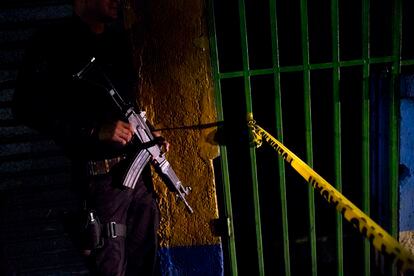
A 2017 report by the organization Crisis Group estimated that $756 million was paid in extortion throughout El Salvador – the equivalent of almost 3% of the country’s gross domestic product (GDP). And yet, despite the enormous numbers, the gangs in El Salvador remain a mafia of the poor.
Another sector where extortion has also been drastically reduced is in the informal trade in markets. EL PAÍS consulted with two leaders of one of the main vendor unions in downtown San Salvador, the heart of informal commerce in the capital. In two visits of the city’s markets and in conversations with some vendors, most claimed to have stopped paying. “I dare to say that extortion has dropped to 20% compared to what we were paying before the state of emergency,” says one of the leaders consulted.
A United Nations study published in June 2020 indicates that just street vendors and product distributors paid around $20 million in “fees” to gangs in 2015. On November 16, in an interview in a local news, the Minister of Justice and Security, Gustavo Villatoro, said that extortion had been reduced by 80% nationwide.
“The Beast is mortally wounded”
A police investigator and a prosecutor who have been investigating MS-13 businesses in El Salvador for 10 years agreed to speak to EL PAÍS in early November on condition of anonymity. Both agree that the gang’s recruitment capacity, territorial control and criminal economy are at critical levels.
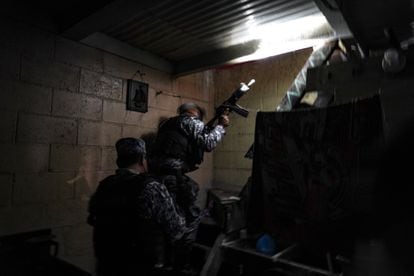
“The Beast is mortally wounded and right now there is no sign that this is going to change,” says the police investigator, referring to MS-13, which is often called “The Beast” by its members. According to the investigator, who has been fighting organized crime for more than 20 years, MS-13 has lost its ability to control the territory and, therefore, to recruit more members.
“Right now, they are in the shit. They cannot extort money, they cannot steal and they cannot control the businesses in which they launder money. If this were a formal company, MS-13 would have been bankrupt a long time ago,” says the prosecutor. This demise, however, is coming at the cost of El Salvador’s freedoms and rights. Bukele is winning the war, but, according to the allegations, he is doing so by breaking the law.
Sign up for our weekly newsletter to get more English-language news coverage from EL PAÍS USA Edition
/cloudfront-eu-central-1.images.arcpublishing.com/prisa/JTYNBQIJINA5TAMPNZ6KLKGXWE.jpg)
